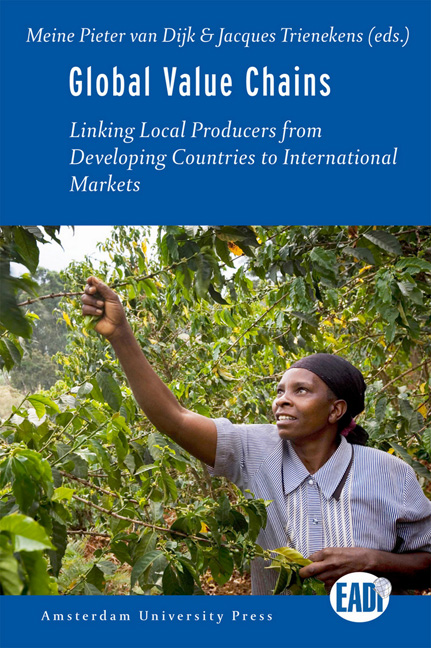Book contents
- Frontmatter
- Contents
- Part I Theoretical Contributions
- Part II Local Agricultural Value Chains
- Part III International Agricultural Value Chains
- Part IV Value Chains in the Industrial and Services Sector
- Part V Conclusions: Upgrading Value Chains in Developing Countries
- About the Authors
- Index
- Miscellaneous Endmatter
11 - A Learning Case of a Local Value Chain: The Banana Subsector in Arusha Municipality and Arumeru District: Producing Banana Beverages
- Frontmatter
- Contents
- Part I Theoretical Contributions
- Part II Local Agricultural Value Chains
- Part III International Agricultural Value Chains
- Part IV Value Chains in the Industrial and Services Sector
- Part V Conclusions: Upgrading Value Chains in Developing Countries
- About the Authors
- Index
- Miscellaneous Endmatter
Summary
Introduction
This study was conducted in order to develop a real-life case of banana beverages. The case was developed in preparation for the value chain development (VCD) course, which is designed and facilitated by Match Maker Associates Limited (MMA). The banana beverages case was selected due to its great potential for learning, i.e. the application of the methodologies and tools provided in the first week of the VCD course, and because the value chain is only active within the region of Arusha. Hence, it enables course participants to visit the major actors and stakeholders in the chain.
Methodology and limitations
This case study was developed through consultations and interviews with various stakeholders in the banana subsector within Arusha municipality and Arumeru district. In addition to primary data, also secondary data obtained from the internet and subsector actors was used. There were no specific limitations that hindered the development of this case study. This case study is to be regarded as a “living document”. It implies that the authors will continue improving the case on the basis of the evolving subsector dynamics, contributions of the VCD course participants, the feedback from the VCD panel and other key actors in the chain and by the comments of peers in VCD.
Structure of the Chapter
As the case is meant for learning purposes, its structure follows the curriculum of the VCD course. The authors feel that it may benefit the “learners” to follow the structure as this enables them to cover all the key elements of the VCD course. The chapter is divided in two parts. The first part covers the subsector definition and analysis and the second part addresses the value chain identification and analyses. It is concluded by strategies for value chain upgrading, and a number of specific recommendations for value chain development.
Subsector analysis and development
A subsector can be defined by either a raw material or a final product/service for a particular market. A subsector is broadly defined to include all the firms that transact with each other in order to supply a particular set of products or services to final consumers. A subsector can include producers, processors, input suppliers, exporters, retailers, etc. In this study, we will define the subsector as “Banana subsector in Arusha Municipality and Arumeru District: With emphasis on banana beverages”.
Information
- Type
- Chapter
- Information
- Global Value ChainsLinking Local Producers from Developing Countries to International Markets, pp. 251 - 272Publisher: Amsterdam University PressPrint publication year: 2012
Accessibility standard: Unknown
Why this information is here
This section outlines the accessibility features of this content - including support for screen readers, full keyboard navigation and high-contrast display options. This may not be relevant for you.Accessibility Information
- 1
- Cited by
